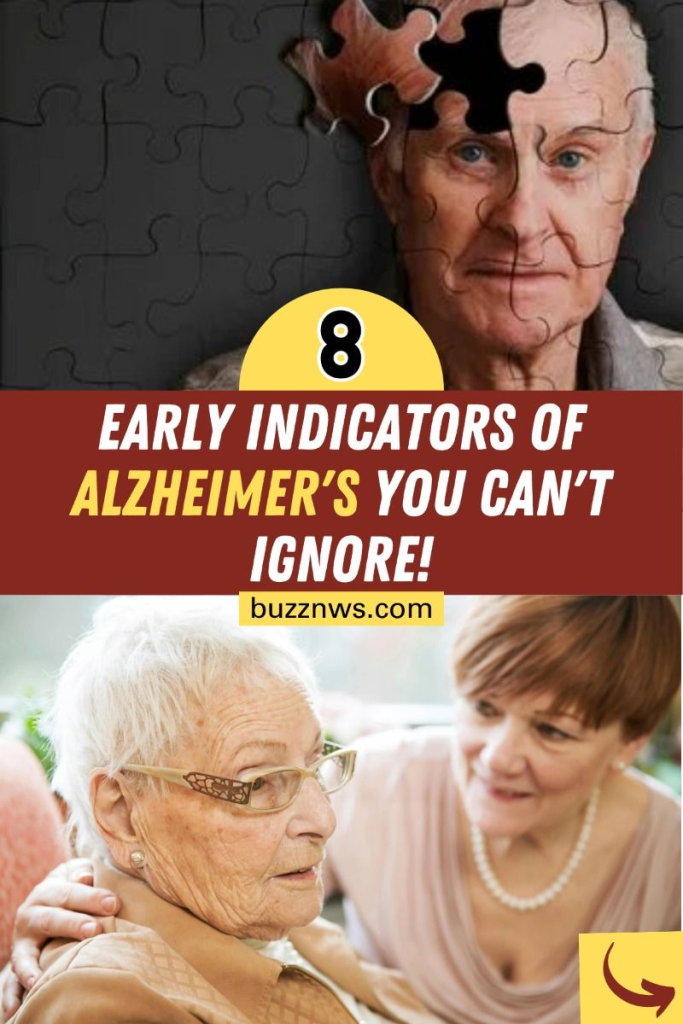
Alzheimer’s disease is a neurodegenerative disease that affects the memory and thinking skills of those who suffer from it. The disease is caused by the build-up of amyloid beta and tau proteins in the brain and it can affect all ages. These proteins form clumps that can damage the neurons and cause them to die. Alzheimer’s symptoms can vary from person to person, but they usually include problems with memory, thinking, and understanding language. There is no cure for Alzheimer’s disease, but there are treatments available that can help improve the quality of life for those who suffer from it.
8 signs of alzheimer’s disease on its early stages
Memory problems

People with Alzheimer’s disease may have trouble remembering names, dates, or what they were doing a few minutes ago. They face difficulties recalling recent memories, focusing, thinking clearly and making decisions.
If you believe that you have a memory problem, it is important to consult a doctor as soon as possible. There are many treatments available, and the sooner you start treatment, the better the chances of success.
Confusion
People with Alzheimer’s disease may have trouble figuring out what is happening around them. They may also become confused about their own identity. It can interfere with their daily activities, communication, and daily living. There are many different types of confusion and each person experiences confusion differently. Some common symptoms of confusion are: difficulty concentrating, trouble understanding what others are saying, feeling lost or confused, and feeling like you are going crazy.
Agitation

Agitation is a common symptom in Alzheimer’s disease, and it can make it difficult for the persons to live their lives. People with Alzheimer’s disease may become restless and agitated, which can make it difficult for them to stay still or focus on anything. Some people experience only occasional episodes of agitation.
However, treatment can help patients feel more comfortable and reduce the amount of agitation they experience. Treatment options may include medications, therapy, and counseling.
Depression
Depression is common in people with Alzheimer’s Disease (AD), and can have a serious impact on the individual and their family. Depression can make AD symptoms worse, interfere with activities of daily living, and increase the risk of death, and can make it even harder for them to cope with their memory and thinking problems.
However, some signs that a person may be depressed include: feeling sad, hopeless, or empty most of the time; having little interest in activities that used to be enjoyed; feeling restless or agitated; difficulty sleeping; losing weight or gaining weight excessively; feeling like the world is a bad place.
If you are concerned that your loved one may be depressed, it is important to talk to them about it. There are many different ways to treat depression, and most people respond well to treatment.
Changes in vision

Vision changes in Alzheimer’s disease can be quite varied and can impact many different aspects of life. Some common changes include difficulty seeing in the distance, blurred vision, and loss of peripheral vision. Additionally, some people with Alzheimer’s disease may experience changes in their vision that are specific to their particular type of dementia. For example, people with early-stage Alzheimer’s disease may experience changes in their vision that make it difficult to read. Changes in vision can also be a sign that Alzheimer’s disease is progressing, and should be evaluated by a doctor.
Changes in mood or personality
Some people may become withdrawn and lose interest in activities they used to enjoy. Others may become more aggressive.
There is no one explanation for these changes. It is likely that the disease is causing changes in brain function that are leading to these changes in mood and personality. It can include a decrease in energy, an increase in irritability, a decrease in interest in activities and in social engagement.
Trouble with movement and coordination

Trouble with movement is also a common symptom in Alzheimer’s disease. This can make it difficult for people to get around, and can make them more likely to fall, which can cause serious injuries.
It’s important for people with Alzheimer’s disease to get regular physical exams. This will help doctors determine if there are any signs of trouble with movement. If there are signs of trouble with movement, doctors may recommend special exercises or treatments to help people with Alzheimer’s disease improve their mobility.
Shortened attention span
People with Alzheimer’s Disease may be unable to focus or concentrate enough to perform a very simple task like eating, dressing or going to toilet.
Warning !
We don’t give any medical advice, diagnosis, or treatment. Consult with your physician or seek medical attention before making any health or food-related decisions.
This article is about some simple general health or food tips that you can find everywhere on the internet, not about some deep professional advice.




















